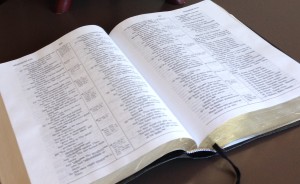“A good case can be made for saying that Christian belief in the Resurrection can be dated to within two years of that very event.” –Craig Blomberg, Ph.D.
I remember sitting in Church when I was young listening to my parents recite these things called Creeds. I remember thinking that this was something they were supposed to memorize but not something they really believed in. As a young person I had important things to memorize, like the times tables, I didn’t need to memorize things at Church too. Or did I?
As I’ve gotten older I find there are many things in life that we want to believe in, things like our relationships, our jobs, our government but somehow they let us down and so we lose faith over and over again. According to what we are taught in secular education we are just here by cosmic chance and we exist as part of the tide of an ever-changing culture. Christianity, however, teaches that we are here by design and that the God of the Universe loves us, as evidenced by His Son Jesus’ sacrifice in our place. So understanding this gives us purpose. I have heard many of my peers say that having faith in something so old as Christianity is just a crutch for the uneducated and downtrodden. But is that true? How can we know that Christianity hasn’t changed its beliefs over time like our culture does?
What I didn’t realize when I was that young person sitting in Church, not paying attention, was that these early Creeds that were being recited give evidence to the fact that Christianity believed what it believes today very early on and it hasn’t changed. By studying the Creeds we can take the foundational belief all the way back to within just a few years following Jesus’ death and resurrection!
If you read the words, for example, to the Nicene or Apostles’ Creed (from the forth century) you find that these are confessions of faith and they point to the same belief that the Apostle Paul wrote about to the Corinthians in the first century and Christianity is still professing today. According to Dr. Gary Habermas, who is a foremost expert on the Resurrection, the 1 Corinthians’ passage tells us that Paul was sharing something he ‘received’ and that he was passing on a holy tradition already in use. The dating for this passage is mid 50’s but because he was passing something on suggests that it was already in use within twenty years of the Resurrection. Habermas also agrees with other scholars who trace it back even further, between two to eight years of the Resurrection.
The Resurrection is the foundation of the Christian faith. The Creeds give evidence that classical Christian belief has held the test of time and for my money I’m going with the trust that Christianity is true!
Now, brothers and sisters, I want to remind you of the gospel I preached to you, which you received and on which you have taken your stand. By this gospel you are saved, if you hold firmly to the word I preached to you. Otherwise, you have believed in vain. For what I received I passed on to you as of first importance: that Christ died for our sins according to the Scriptures, that he was buried, that he was raised on the third day according to the Scriptures, and that he appeared to Cephas, and then to the Twelve. After that, he appeared to more than five hundred of the brothers and sisters at the same time, most of whom are still living, though some have fallen asleep. Then he appeared to James, then to all the apostles, and last of all he appeared to me also, as to one abnormally born. 1 Corinthians 15:1-8 (NIV)
For further reading I highly recommend: Dr. Gary Habermas’ various articles and books on the Resurrection.
Let me know what you think:
- Since Christianity and its foundational beliefs have stood the test of time, would you be willing to put your faith in it? Why, or why not?
- The Resurrection is the lynchpin for Christianity. Are there other reasons to consider Christianity?
Join us next week as we continue our Case for Christianity. In these posts I am going to continue to present logical reasoning and sound scientific evidence not found in the public school textbooks.
This blog is part of a series. You can start the series by going back to the September 1, 2014 Introduction called A Case for Christianity: Why do we need one?
Teri Dugan
TeriDugan@truthfaithandreason.com
Always be ready to give an answer for the hope that you have in Christ Jesus as Lord. 1 Peter 3:15



Sorry, comments are closed for this post.